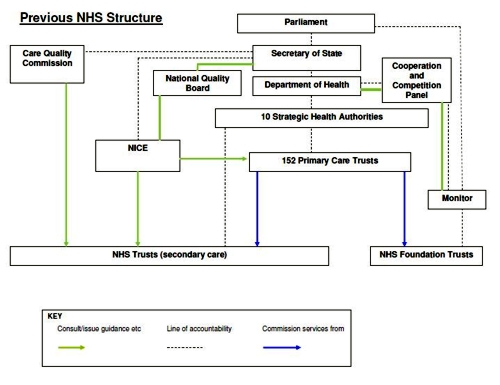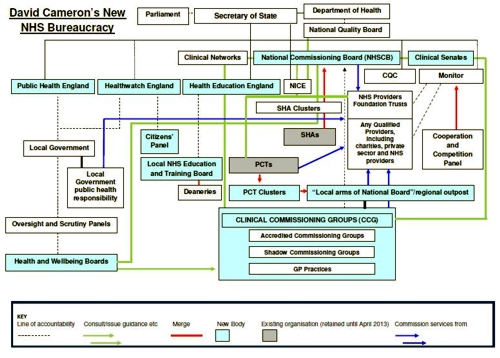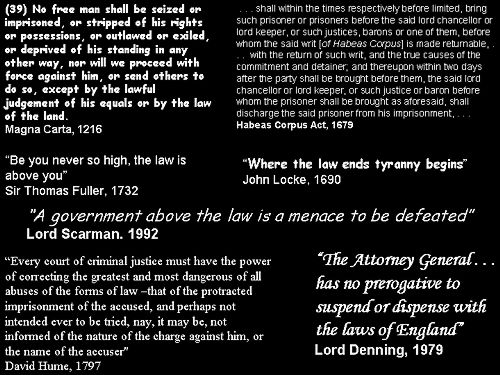Lib Dems
[Use Firefox if embedded videos do not show in Chrome]
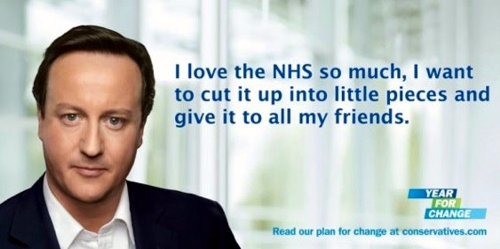
Andrew Lansley’s Health Bill (HASSB) aims to change the NHS into something more like the US system, which gives worse results at twice the cost.
The only possible reason for wanting to do that is simple far-right ideology. No wonder that no hint was given of its intentions before the election.
On the contrary, David Cameron stated repeatedly that there would be no top-down reorganisation of the NHS. That turned out to be a straight lie.
“First let me tell you what we are not going to do. There will be no more of those pointless reorganisations that aim for change, but instead bring chaos.” [David Cameron speaking to Royal College of Nursing in 2009, before election].
We all know that money must be saved. But the two major disasters of the coalition government don’t save any money.
On the contrary, both tuition fees and NHS-wrecking will cost taxpayers’ money. The tuition fees are done (for the time being) but there is still time to save the NHS.
The best simple explanation that I’ve found is by Dr Max Pemberton in the Telegraph: Read this – and prepare to fight for your NHS. The Bill is three times longer than the 1946 Bill that brought the NHS into existence.
“The power to determine the services that make up the NHS will be transferred from the Secretary of State to newly created Clinical Commissioning Groups (CCGs), which are unelected. Members will include GPs but also company chief executives who can, if they wish, outsource decisions about the appropriate level of services offered to companies with commercial interests. This is what the Government means when it says it is handing GPs £60 billion of NHS money. ”
“Monitor. This quango is composed of unelected and unaccountable individuals. It will not have overarching responsibility – which the Government does currently – to ensure that everyone’s health needs are met.” “It will have the power to decide, on purely financial grounds, if an area loses its existing range of hospital services, such as A&E departments, with no duty to consider alternative provision.
“With so many different providers of health care created under this Bill, those with complex health care needs may not receive the joined-up medical care that the NHS now works hard to provide.”
“Less profitable patients – those requiring complex levels of care from multiple individuals and areas of expertise, for example – may be sidelined by these private companies. ”
“the Bill allows CCGs to contract out commissioning functions to private accountancy, health insurance and management consultant firms, which will be able to decide what care is provided free at the point of use through the NHS and what is not. This means that profit-making companies will be able to provide your clinical care and also decide what you’re entitled to under the NHS and from which care providers.” “There is the potential for commercial conflicts when the needs of shareholders come between doctors and patients. ”
“Providers, too, can reduce levels of service provision and entitlement to NHS-funded care and there are no restrictions on charging for non-NHS care.”
“Now, up to 49 per cent of income can be generated from private income. This means that almost half the beds currently used for NHS care could be given over to private patients.” “This could create a two-tier system in hospitals” and “create a conflict of interest, with hospitals having a clear incentive to encourage as many patients as possible to use the private half of their facilities. Moreover, hospitals can decide when to discharge patients. The requirement for coordinated discharge and aftercare of patients between health and social care is abolished in the Bill. “
Why is the bill needed at all?
Most people believe that there is no need for a bill. The real aim appears to be in part 3, which proposes a vast increase in private providers. Oliver Huitson says
“A US report comparing the health services of 7 major economies ranked the NHS 1st in terms of efficiency, and 2nd overall. The US, which has vast private sector involvement and much greater use of GP commissioning, was ranked last despite spending more than twice as much per head as the UK”
” Despite being ranked as one of the most efficient and equitable health services in the developed world, the Conservatives are determined to remodel it in the image of one of the least efficient – all in the name of “improving efficiency”.”
Although most GPs are in favour of having more say in what happens, even the first parts of the bill are a mess. They are advertised as reducing bureaucracy and reducing costs. According to the Financial Times, they do exactly the opposite.
“Here was the original NHS bureaucracy in graphic form”
Here is the new NHS bureaucracy in graphic form
Ed Miliband pointed out that the number of NHS statutory organisations was growing from 163 to 521 – including “health and wellbeing committees,” “national commissioning boards”, “clinical networks”, “clinical senates” and so on.
So much for reduced bureaucracy.
Who thinks this is not a good idea?
Almost everyone. Not just the BMA which Lansley dismisses as a Trade Union, despite the fact that now (unlike in 1948) the BMA is voting against the financial interests of its members.
The Royal College of General Practitioners says Drop the Bill. So do Royal College of Nursing. Royal College of Midwives, Faculty of Public Health, Chartered Society of Physiotherapists, the Patients’ Association, among others. Almost the only support left is from the NHS Alliance, a tiny organisation run by Michael Dixon, friend of the Prince of Wales and advocate of quack medicine. The NHS alliance ran its own poll. A total of 100 people have voted so far, 99 of them against the Alliance’s policy. Some support. A rather good infographic shows how the balance lies.
The BMA’s General Practitioners Committee, which represents all GPs in the UK says [read full letter]
“1. Formally reaffirms its opposition to the NHS Health and Social Care Bill;
2. Believes that if passed the Bill will be irreversibly damaging to the NHS as a public service, converting it into a competitive marketplace that will widen health inequalities and be detrimental to patient care; . . . .”
In contrast, the e-petition to the government, started by Dr Kailash Chand OBE, states simply that it “Calls on the Government to drop its Health and Social Care Bill.”. It now has over 167,000 signatories. But despite the fact that petitions with over 100,000 signatures are meant to trigger a debate in the House of Commons, the backbench business committee of MPs has decided not to debate the e-petition.
So many people have rallied to oppose the daftness that it’s invidious to single out names. Nonetheless special mentions must go to Clare Gerada (@clarercgp on Twitter) (chair of the RCGP), and to Clive Peedell (@cpeedell) (oncologist and co-chair NHS Consultants’ Association) -read his Bevan’s Run blog. Among academics, Allyson Pollock and Martin McKee have done superb work on the details.
Most telling of all, some of the people who started by supporting Lansley have changed their minds. One concern about the “any qualified provider” idea is that it could open the door to quackery. Any “qualified” homeopath could bid for business at a competitive rate -sugar pills don’t cost much. Michael Dixon is one such.
Dr Sam Everington of Tower Hamlets is another. Services provided by his practice include “referrals to Inside Out Health and Wellbeing Ltd“. This private company will sell you fraudulent scams like homeopathy and kinesiology at £50 per session, among other nonsense (according to Companies House, it was wound up on 17 January 2012). He’s also associated with the “College of Medicine” (the reincarnation of the Prince of Wales’ Foundation). See also, Dr Margaret McCartney’s blog. As chair of the first Clinical Commissioning Group (CCG) he was embraced by Cameron. His Bromley-by-Bow surgery was host for Andrew Lansley’s first speech as health secretary after the 2010 election, and also host to the Prince of Wales..
But now even Everington has turned against the Bill (read the full letter).
“Dear Prime Minister
The Board of NHS Tower Hamlets Clinical Commissioning Group ask you to reflect and to withdraw the Health and Social Care Bill.”
“We care deeply about the patients that we see every day and we believe the improvements we all want to see in the NHS can be achieved without the bureaucracy generated by the Bill.
Your government has interpreted our commitment to our patients as support for the bill. It is not.”
And, on 1st March, another request to drop the bill, from the East London Integrated Care (ELIC is a not-for-profit social enterprise which is owned and run by local people and health professionals”). Read the full letter.
“Thursday, 1 March 2012 N1 5LZ
Dear Prime Minister,
The Board of City & Hackney Clinical Commissioning Group (CCG) join Tower Hamlets
and most other GPs and nurses and ask you to withdraw the Health and Social Care Bill.”
Is it really privatisation?
If you feel reassured by Lansley’s assurances that his measures aren’t de facto privatisation, just watch this video. It reveals some of the network of lobby groups that are circling the NHS, eager to take your money. For example, the lobby group, Policy Exchange, “Cameron’s favourite”, co-founded by Francis Maude, a member of Cameron’s cabinet, and is lobbying for more private sector provision of NHS services. One of the companies that it’s taken money from is called Tribal, which wants to take over commissioning from GPs. One of the directors of Tribal has described Andrew Lansley’s reforms as being “denationalisation of health services in England”.
So you don’t need to listen to left-wingers. The industry itself is in no doubt that it’s privatisation, and it’s ready and waiting to grab our money..
And of all unlikely allies, the vice chair of the British Holistic Medical Association has written a powerful letter about how the bill really would result in privatisation.
The likely consequences have been put well by Ben Goldacre in his What will happen with the NHS bill, in 5 tweets. The following points are based partly on this.
- GPs know they’re being set up to fail by being given commissioning powers, which they have neither the time nor the expertise to do properly.
- After GPs fail, private commissioning expertise will be needed. Large private companies will be given the job and they will come to operate like health insurers.
- These large bodies, like public/private insurance companies, will be able to pick and choose patients. They will naturally prefer the ones from whom they can make the most money (and not the sick or the old). Note that there is no geographical responsibility in the bill
- Small differences will gradually emerge in what services they offer. Top up plans will become available. And that will be the end of the NHS in the form in which we know it.
The only way that the proposals make any sense at all is if the underlying aim is to destroy the NHS, in anything like its present form. I believe that Lansley’s aims are much more to do with his personal political ideologies than anything to do with health. Those ideologies are far to the right of anything envisaged by Margaret Thatcher.
The politics. Where are the Lib Dems?
I voted Lib Dem in 2010, and I said precisely why. Of course I didn’t expect they’d get a majority. They were just the party that I found least objectionable. Like so many others I watched with horror as the numbers came out. There was no other option but to form a coalition with Conservatives. Well, I’d have been happier with no coalition, but the danger of that producing an overall majority for Conservatives after a year or so made that a very risky option.
When the coalition formed I was alarmed by the prospects for both education and for the NHS. I was less alarmed by the latter, because Cameron had said so many times that he had no intention of messing with the NHS. That turned out to be a direct lie. I could scarcely believe it when Lansley produced a plan after the election for the biggest reorganisation ever in the NHS, something that had not been foreshadowed in any way in the Conservative manifesto. This was one of the most dishonest bits of political manoeuvring that I’ve ever encountered.
Clearly we were spending more than we could afford. What’s unforgivable is to do things that actually cost the taxpayer more than before. Such actions are quite the opposite of cuts. Yet they are being done in the two areas, than any others, that have got Lib Dem voters angry.
(a) The £9k tuition fees cost the taxpayer more than the £3k fees did, because of the financing arrangements. I can see no conceivable reason for spending more taxpayers’ money than before apart from (Conservative) political ideology. That’s done (for now) so back to the main topic of this post, the NHS.
(b) It seems inevitable that Lansley’s proposals will cost money, not save money. Presumably that was predicted in the risk register, the concealment of which is a disgrace. See Liberal Conspiracy and the Green Benches blogs. The Information Commissioner ordered the release of the risk register, but the coalition refused (so much for transparent government). They appealed so now it goes to an Information Tribunal.
An Early Day Motion in the House of Commons urged release. It was signed by only 16 Lib Dems.
The bill started to fall apart in a major way when, on February 6th, The Times reported that
“Andrew Lansley should be taken out and shot,” says a Downing Street source. “He’s messed up both the communication and the substance of the policy.”
But Cameron, instead of grasping the chance, decided to back a loser.
Some Lib Dems have stuck to their principles. For example
John Pugh MP, Co-Chair of the Lib Dem Parliamentary Health Committee, re-established the Beveridge group, and wrote a letter to parliamentarians to explain why.
Andrew George MP wrote Health Bill has no friends. Dignified withdrawal would be best.
On 13 February, hearts soared when Lib Dem peer Shirley Williams spoke out at last. She urged Lansley to drop part 3 of the bill, the part that deals with privatisation. The elation didn’t last long though. Nick Clegg told the BBC: “Andrew Lansley is the architect of the NHS bill. He cares passionately about the NHS. He’s the right man for the job and he must see it through.”. Yes, I know about Cabinet solidarity, but it’s hard to think of any surer way to lose elections than to make statements like that. Even many Conservatives don’t believe it: see, for example, Dr Rachel Joyce on Conservative Home.
On 24th February, the Lib Dem president, Tim Farron MP, spoke up at last. “Mr Farron told ITV the bill should have been “massively changed” or dropped earlier and he wanted plans for more competition in the NHS to be dropped”.
On 26 February, Nigel Crisp, described the bill as a confusing mess that risks setting the NHS back. Crisp was formerly NHS chief executive and the permanent secretary at the Department of Health from 2000 to 2006, and is now a crossbench peer. Like everyone else, he was ignored.
The elation about Shirley Williams intervention didn’t last long. On 27th February a joint letter from Williams and Clegg claimed that they’d fixed the bill. The letter was quickly subjected to a bullshitometer analysis, by Health Policy Insight. Bafflingly, Lansley declared in public that he’d “changed his mind” about the privatisation, while at the same time Lansley and Cameron claimed that nothing much had changed: see Downing Street in knots as it plays down Nick Clegg’s NHS concessions, and Paul Corrigan’s blog.
March 1st saw two more blows for Clegg and Lansley. First, as reported thus in the Independent.
“Graham Winyard, the former deputy Chief Medical Officer, resigned from the party in protest at the leadership’s backing for the Bill. Dr Winyard, who was chairman of Winchester Liberal Democrats until last year, told Mr Clegg in a letter: “It is just not sensible to impose this top-down reorganisation on an NHS struggling to meet the biggest financial challenge in its history. To continue to do so in the face of near unanimous opposition from patient, staff and professional organisations simply invites slow motion disaster both for the NHS and for the party.” He said that he had no option but to resign “with great sadness”. “
Then, also on 1st March, Dr Laurence Buckman, chairman of the BMA’s GPs committee, wrote to 22,000 GPs. [full letter]
- Believes the bill will compromise the role of GPs, and could cause irreparable damage to the relationship between GPs and their patients.
- Believes the bill to be complex, incoherent and not fit for purpose, and almost impossible to implement successfully, given widespread opposition across the NHS workforce.
- Believes that passing the bill will be an irresponsible waste of taxpayers’ money, which will be spent on unnecessary reorganisation rather than on patient care, as well as increasing the running costs of the NHS from the processes of competition, and transaction costs
The chaos that the Lib Dems now find themselves in is illustrated clearly by a post on Liberal Democrat Voice by Andrew Tennant. He’s apparently an unreconstructed 19th century Whig, masquerading as a 21st century liberal. The comments on the post reveal the mess the party has got itself into by refusing to drop the bill.
More to the point, look at the proper detailed analyses done by people who are a lot more knowledgeable than Andrew Tennant, or Andrew Lansley.
- RCGP Report Stage Briefing – Health and Social Care Bill February 2012
- Allyson Pollock explains, line by line, a lot of problems that “Recent amendments put forward by the Liberal Democrats do not address”.
- Statement on Liberal Democrat amendments
Prof Allyson Pollock, David Price, Peter Roderick, and Tim Treuherz
28 February 2012 - Royal College of Physicians, in The Lancet “What began as a ham-fisted attempt to modernise the NHS has become a grotesque political disaster for government.”
- The NHS bill could finish the health service – and David Cameron Polly Toynbee says it as it is.
- A big document by SOSNHS -great source of links Breaking the NHS.
There is one last chance for the Lib Dems to restore their reputation. Lib Dems hope to finally kill health reforms. “Liberal Democrat activists will defy Nick Clegg over the Government’s controversial health reforms by seeking to “kill” them at a party policy-making conference next week.”
Good luck to them. They could save the Lib Dems if they win. Much more importantly, they could save the NHS.
Follow-up
Sunday 4 March. Yet another story of corruption, this time in the Mail on Sunday.
“The head of the NHS regulator that is meant to ensure fairness when private-sector firms bid for public contracts is also the chairman of a huge company whose Health Service business is worth £80 million a year – and set to increase massively.
As the chairman of the NHS Co-operation and Competition Panel (CCP), Lord Carter of Coles is paid £57,000 for two days’ work each week. But his other role, as chairman of the UK branch of the American healthcare firm McKesson, is more generously rewarded. Last year it paid him £799,000.”
“Dr Clare Gerada, chairman of the Royal College of General Practitioners, said: ‘He cannot have any credibility when he is also heading a company with such huge interests in the very contracts his organisation is meant to police.”
See also Conflicts of Interest and NHS reform.
According to a tweet from James Ball
“Politics of the #NHSbill awful for lib dems: only 17% of their current supporters back it – and only 9% of their 2010 voters.”
Sounds plausible. Are you listening, Nick Clegg?
5 March 2012. The emergency motion for the Lib Dem Spring Conference (March 10 -11) has been published. See also the blog of the heroic Dr Charles West for more details. If Clegg manages to defeat this excellent motion, the last chance to save the NHS will be gone.
10 March 2012
Bitterly disappointed by vote at Lib Dem conference, not to debate the motion to drop the NHS bill. Who do I vote for now?
One thing that one can still do is to email all Lib Dem MPs give your views. Here is a list of their email addresses (via Lindy).
bakern@parliament.uk, danny.alexander.mp@parliament.uk, alan.beith.mp@parliament.uk, gordon.birtwistle.mp@parliament.uk, brookea@parliament.uk, braket@parliament.uk, brownej@parliament.uk, hernandeza@parliament.uk, burstowp@parliament.uk, lorely.burt.mp@parliament.uk, cablev@parliament.uk, menzies.campbell.mp@parliament.uk, carmichaela@parliament.uk, nick.clegg.mp@parliament.uk, mike.crockart.mp@parliament.uk, farront@parliament.uk, daveye@parliament.uk, simon.wright.mp@parliament.uk, willottj@parliament.uk, featherstonel@parliament.uk, fosterd@parliament.uk, andrew.george.mp@parliament.uk, duncan.hames.mp@parliament.uk, stephen.gilbert.mp@parliament.uk, stephenwilliamsmp@parliament.uk, kennedyc@parliament.uk, jo.swinson.mp@parliament.uk, julian.huppert.mp@parliament.uk,hunterm@parliament.uk, simon@simonhughes.org.uk, chris.huhne.mp@parliament.uk, martin.horwood.mp@parliament.uk, hemmingj@parliament.uk, david.heath.mp@parliament.uk, hancockm@parliament.uk, pagep@parliament.uk, lambn@parliament.uk, lawsd@parliament.uk, john.leech.mp@parliament.uk, stephen.lloyd.mp@parliament.uk, michaelmooremp@parliament.uk, greg.mulholland.mp@parliament.uk, teathers@parliament.uk, tessa.munt.mp@parliament.uk, john.thurso.mp@parliament.uk, david.ward.mp@parliament.uk, webbs@parliament.uk, williamsmf@parliament.uk, williamsr@parliament.uk, pughj@parliament.uk, reida@parliament.uk, contact@danrogerson.org, susan.hislop@parliament.uk, robert.smith.mp@parliament.uk, stunella@parliament.uk, ian.swales.mp@parliament.uk
And here are email addresses for (most) Lib Dem peers)
williamss@parliament.uk, walmsleyj@parliament.uk, wallacej@parliament.uk, wallacew@parliament.uk, tordoffg@parliament.uk, topeg@parliament.uk, thomascm@parliament.uk, thomass@parliament.uk, stephenn@parliament.uk, smitht@parliament.uk, shipleyj@parliament.uk, shuttd@parliament.uk, sharpm@parliament.uk, scottrc@parliament.uk, robertsr@parliament.uk, rennardc@parliament.uk, randersonj@parliament.uk, palmerm@parliament.uk, oakeshottm@parliament.uk, northoverl@parliament.uk, newbyr@parliament.uk, millers@parliament.uk, methuenr@parliament.uk, methuenr@parliament.uk, maddockd@parliament.uk, maddockd@parliament.uk, maclennanr@parliament.uk, loombar@parliament.uk, linklaterv@parliament.uk, lestera@parliament.uk, leej@parliament.uk, kramers@parliament.uk, jonesn@parliament.uk, ecem@parliament.uk, harrisa@parliament.uk, hamwees@parliament.uk, greavesa@parliament.uk, goodhartw@parliament.uk, germanm@parliament.uk, gardens@parliament.uk, falknerk@parliament.uk, ezrad@parliament.uk, dholakian@parliament.uk, cotterb@parliament.uk, clementjonest@parliament.uk, chidgeyd@parliament.uk, carlilea@parliament.uk, brintons@parliament.uk, willisg@parliament.uk, addingtond@parliament.uk , alderdicej@parliament.uk, allanr@parliament.uk, ashdownp@parliament.uk, barkere@parliament.uk, benjaminf@parliament.uk , bonhamcarterj@parliament.uk
13 March 2012. This is really last chance day. At 11 am, the Lords debate third reading of health bill and at 2 pm the Commons have emergency debate, triggered by the e-petition, which now has more than 173,000 signatures. I sent the following email to all Lib Dem peers and MPs this morning.
|
The idea that the changes to the health bill have solved its problems is simply wrong. Before you vote, please read http://abetternhs.wordpress.com/2012/03/11/40points/ ,
That is written by a working GP who knows what he’s talking about. For the truth about the 49% disaster, read this. There are 27 professional organisations who are against the bill (see here). Do you really understand the implications better than they do? The vote at the lib dem conference gives you the mandate to vote according to your conscience. Please vote to drop the bill and start again. I voted Lib Dem at every election from 2001. If you let us down on the health bill, I will certainly not do so again. David Colquhoun |
16 March 2012. I have learned ( from Lord Shutt) that there will be a 3-line whip on Lib Dem peers to vote against Lord Owen’s amendment. And this despite the vote against the Clegg-Williams motion at the Lib Dem conference last week. This makes the much vaunted party democracy look like a bit of a joke. The only hope now is the bishops. Here is a list of their email addresses. You can also contact them through Dr Éoin Clarke’s site (from where I got the addresses)
bishop@bathwells.anglican.org, bishop@birmingham.anglican.org, chaplain@bishopofblackburn.org.uk, bishop@bristoldiocese.org, bpchester@chester.anglican.org, bishchichester@diochi.org.uk, bishop@bishopofderby.org, durham@durham.anglican.org, langrishm@parliament.uk, bshpglos@glosdioc.org.uk, bishop.christopher@cofeguildford.org.uk, bishop@hereford.anglican.org, bishop.tim@leccofe.org, bishop.lichfield@lichfield.anglican.org, bishopslodge@liverpool.anglican.org, bishop@londin.clara.co.uk, bishop@bishopscourt.manchester.anglican.org, bishop@newcastle.anglican.org, bishop@norwich.anglican.org, bishop@riponleeds-diocese.org.uk, bishop.nigel@stedmundsbury.anglican.org, bishop@bishopofwakefield.org.uk, contact@lambethpalace.org.uk, office@archbishopofyork.org
This is what I sent to them today.
|
Dear Bishop,
You will be aware of the widespread concerns about the commercialisation of the NHS. No fewer than 27 medical organisations have now come out strongly against the bill and it’s clear that, despite (or because of?) over 1000 amendments, it is a real mess. Despite the vote at the Lib Dems conference against the bill, I hear that there will be a 3-line whip in the Lords to force Lib Dem peers to vote against the very sensible proposal by Lord Owen to delay passing of the bill until the government release the assessment of the risks of passing it. This means that the Bishops will be crucial. I would like to ask you seriously to consider voting for Lord Owen’s motion on Monday. The future of the National Health Service lies in your hands Best regards |
18 March 2012. Tomorrow is last hope for stopping the bill in the Lords. The 3-line whip will, I expect, ensure the defeat of Lord David Owen’s excellent amendment. The bill will probably become law. Two tweets express the impending death of the NHS quite poignantly. On 15 March @Heardin London wrote
"For a brief period during 20th century, people gave a fuck and looked after each other. Unfortunately this proved unprofitable."
and today, from @thewritertype,
"Years from now you’ll have to explain to children what the NHS was. Then you’ll have to explain what a LibDem was."
Poetry in 140 characters.
20 March 2012.
|
The hated bill was rammed through in the House of Commons, thanks to support from Lib Dems. .The list of the peers and MPs who will make money out of privatisation is truly scary and deeply corrupt. |
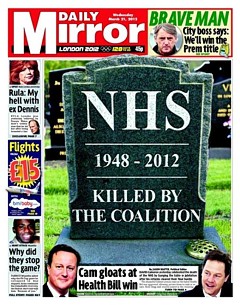
|
I voted labour in every election (apart from my very first) up to and including 1997. This is about my feelings for the 2010 election. Make up your own mind (but don’t let Rupert Murdoch manipulate you).
Downloadable button from Mark Golding at http://www.coia.org.uk
Don’t Get Fooled Again “I agree with Rupert“
By 2001 election, I had been forced to the conclusion that Tony Blair had views that were well to the right of Margaret Thatcher’s, in many areas that mattered to me. so I voted Lib Dem. That was before 9/11 After that event, all doubt was gone, so the 2005 election it was Lib Dem again.
I won’t even consider the Conservative party much. I have never understood how anyone could vote for them, ever. The only choice for me is Lib Dem versus Labour. Let’s try to be fair. Labour has done some good things (though most of them would probably have been done by Lib Dems too).
- Minimum Wage Act 1998 was a great innovation
- The Freedom of Information Act (2000) was a major step forward for openness and democracy.
- Nursery school places have increased
- Heating allowances for pensioners (though not sure that I should have got it)
- The funding for the NHS was increased considerably and it has been very good for me (see Why I love the NHS).
- Funding for science increased considerably
Against the big increases for the NHS must be set the huge increase in the number of highly-paid managers, relative to the number of nurses and doctors, that has occurred under Labour.
Bad things that labour has done
It was obvious from an early stage that Labour were in favour of selective schools (but were not honest about). They certainly favoured religious selective schools, and still do.
The explicit support of Tony Blair for creationist schools and his implicit support for homeopathy are distasteful, but not in themselves sufficient reason for voting against him. The decisive thing for me is the Labour government’s careless attitude to human rights and free speech.
Nothing made that clearer than the Iraq war and its aftermath.
Saddam Hussein was a wicked dictator, Sadly the world has many wicked dictators. One wishes they would all go away. But only one of the world’s wicked dictators was singled out to be invaded. It was already clear before 1997that Iraq had been picked out by American neoconservatives as a ‘special case’. They didn’t get far until the election of George Bush in 2001, and the tragedy of the twin towers, 9/11, gave them the chance they sought.
George Bush was perhaps the most extreme right wing president in US History (as well as one of the most stupid). As someone who seemed to have difficulty in distinguishing between real life and a B-movie, his behaviour may not be surprising, but it brought shame on his country. His regime’s legitimisation of torture is, to my mind, the greatest disgrace that has happened during my adult lifetime.
It was with increasing incredulity that I watched Tony Blair’s poodle-like behaviour to Bush. It seemed incredible that any normal human. let alone a Labour prime minister could behave like that. The sight of two such men, both believing that god was on their side was scary in the extreme.
Some things are in danger of being forgotten with the passing of time. All these and much more were documented on my politics blog, up to the point when Blair left office.
- Remember the US governments legalisation of torture. That caused no wavering in Blair’s support.
- Remember the plagiarised dossier? Any student would have been fired for that, but Blair shrugged it off.
- Remember how the attorney general mysteriously changed his mind about the legality of the war?
- Remember Abu Ghraib? If not, read Seymour Hersh.
- Remember the ex-aide to Blair who said
“I couldn’t help feeling TB was rather relishing his first blooding as PM, sending the boys into action. Despite all the necessary stuff about taking action ‘with a heavy heart’, I think he feels
it is part of his coming of age as a leader.”and how the government tried to tone down his remarks.
- Remember David Kelly? The death of a good man must be largely the fault of Blair’s government.
- Remember how, eventually, generals and even neocons turned on Bush, but Blair would still not admit any mistake?
- Remember the Hutton report, and the vicious attacks on the BBC’s independence that followed it?
- Remember the attempts to conceal ‘rendition’ (i.e. .torture by proxy).
- Remember the wonderful efforts of UCL lawyer, Phillipe Sands, to expose illegal activities by both US and UK governments. He is someone of whom UCL can be very proud.
The good done by the Freedom of Information Act has to be set against their sloppy attitude to human rights, as evidenced by their constant attempts to extended detention without charge or trial. In 2004 I made the following poster, based on a dramatic front page of the Independent, 18th Dec. 2004. It is still relevant.
This followed the ruling pf the Law Lords that the government’s detention policy was illegal
“The real threat to the life of the nation, in the sense of a people living in accordance with its traditional laws and political values, comes not from terrorism but from laws such as these. That is the true measure of what terrorism may achieve. It is for Parliament to decide whether to give the terrorists such a victory.” Lord Justice Hoffmann, in the 8-1 ruling of the Law Lords that the UK government’s policy of detention without charge is illegal. [Washington Post] , [Original report]
The sight of Blair acquiescing to the wish of the most right-wing neoconservative government in the western world sickened me unspeakably, and still does, The happy days of 1997 seemed to be a long way away.
That was Blair, but Gordon Brown and most of the Labour cabinet looked on and did nothing.
David Miliband said “You’ve punished us enough about Iraq”. Well no, you haven’t been punished at all, Yet. As someone said on twitter, resuscitate the 100,000 dead and we’ll forgive you.
|
I’m still baffled about why the crowd that gathered in UCL’s quad for the start of the second great march on 20th March 2003, were able to predict the outcome of the invasion so much more accurately than the government. |
UCL quadrangle 20 March 2003 Click here to download high resolution |
Apart from the war
Brown is guilty not only of supporting the war.
He has supported segregated religious schools and the reintroduction of "academy" schools, both being ways of surreptitiously re-introducing selection into the education system
He and Blair presided over an endless multiplication of box-ticking quangos. The intention was, no doubt to increase quality, but the effect has been exactly the opposite. Just look, for example, at Skills for Health, the QAA, the QCA and a multitude of others.
These are some of the reasons that I cannot vote "Labour" this time. They have become. in many ways, a party of the right, barely distinguishable from the Conservative party (and in some respects, further to the right). Remember that the Conservatives supported Blair in his love affair with George Bush, they support selective schools, they support religious schools. And they are even more likely that Labour to sell their soul to Rupert Murdoch. Imagine Fox "News" coming to the UK and be afraid, very afraid.
Why Liberal Democrats?
Since I find it impossible to vote Labour this time. they are the only option. But I think one can be a bit more positive than that.
Some of the reasons why are listed in a letter in today’s Guardian (the list of signatories is remarkable). The Lib Dem manifesto is here.
- The Lib Dems are more likely than the other parties to roll back New Labour’s attack on civil liberties
- Lib Dems tax and green policies look pretty good to me.
- The cost of replacing Trident missiles could be around £100 billion, and if that were spent it is doubtful whether what you get is useful under present conditions. Only Lib Dems would rethink this ghastly waste of money. Brown and Cameron prefer macho posturing.
- Brown’s judgment about banks was wrong, yet he still won’t separate the casino banks and the savings banks. Lib Dem’s would.
- Lib Dems have been more open about how cuts would be made than other parties (if not 100%). Vince Cable for Chancellor.
- Nick Clegg’s response to the letter sent party leaders by the Campaign for Science & Engineering CaSE) was clearly better than the others,in many respects. See also Lib Dems science policy test
- Can you imagine a better science minister than Dr Evan Harris?. I can’t.

